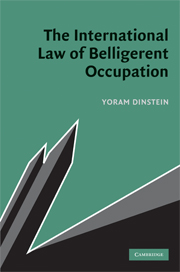Book contents
- Frontmatter
- Contents
- Preface
- Table of cases
- Table of treaties
- Table of UN Resolutions
- List of abbreviations
- 1 The general framework
- 2 The legal nature and basic principles of belligerent occupation
- 3 Human rights and belligerent occupation
- 4 The maintenance of law and order in occupied territories
- 5 Legislation by the Occupying Power
- 6 The judicial system in occupied territories
- 7 Protection of the civilian population under belligerent occupation
- 8 Special protection in occupied territories
- 9 Destruction and pillage of property in occupied territories
- 10 Seizure and use of property in occupied territories
- 11 Other major issues relating to belligerent occupation
- 12 The termination of belligerent occupation
- Conclusion
- Index of persons
- Index of subjects
- References
7 - Protection of the civilian population under belligerent occupation
Published online by Cambridge University Press: 24 January 2011
- Frontmatter
- Contents
- Preface
- Table of cases
- Table of treaties
- Table of UN Resolutions
- List of abbreviations
- 1 The general framework
- 2 The legal nature and basic principles of belligerent occupation
- 3 Human rights and belligerent occupation
- 4 The maintenance of law and order in occupied territories
- 5 Legislation by the Occupying Power
- 6 The judicial system in occupied territories
- 7 Protection of the civilian population under belligerent occupation
- 8 Special protection in occupied territories
- 9 Destruction and pillage of property in occupied territories
- 10 Seizure and use of property in occupied territories
- 11 Other major issues relating to belligerent occupation
- 12 The termination of belligerent occupation
- Conclusion
- Index of persons
- Index of subjects
- References
Summary
Freedom from genocide and the right to life
The prohibition of genocide
344. Every national group – including the civilian population of an occupied territory – has a basic right to existence (i.e., to life) protecting it from genocide. Article I of the 1948 Convention on the Prevention and Punishment of the Crime of Genocide asseverates:
The Contracting Parties confirm that genocide, whether committed in time of peace or in time of war, is a crime under international law which they undertake to prevent or to punish.
The wording appears at first sight to relate to acts perpetrated by actors other than the Contracting Parties themselves. But in the 2007 Genocide Convention case (Bosnia/Serbia), the International Court of Justice held that – although ‘[t]he article does not expressis verbis require States to refrain from themselves committing genocide’ – such a prohibition follows from the obligation to prevent the commission of genocide. As the Court put it, ‘[i]t would be paradoxical’ if States ‘were not forbidden to commit such acts through their organs’ while they are under obligation to prevent genocide. The Judgment added that the obligation not to commit genocide applies ‘to a State wherever it may be acting or may be able to act’, in a manner that is not limited by territorial bounds. This patently covers occupied territories.
- Type
- Chapter
- Information
- The International Law of Belligerent Occupation , pp. 146 - 179Publisher: Cambridge University PressPrint publication year: 2009



